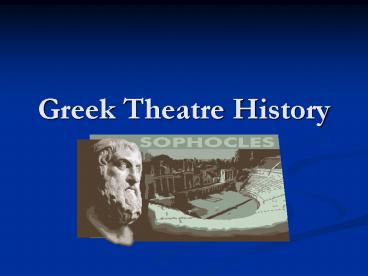Greek Theatre History - PowerPoint PPT Presentation
Title:
Greek Theatre History
Description:
Greek Theatre History Greek Theatre Grew out of religious ceremonies (rituals), which were prominent features of Greek society Ceremonies included funeral services ... – PowerPoint PPT presentation
Number of Views:274
Avg rating:3.0/5.0
Title: Greek Theatre History
1
Greek Theatre History
2
Greek Theatre
- Grew out of religious ceremonies (rituals), which
were prominent features of Greek society - Ceremonies included funeral services, festivals
celebrating the seasons, and ceremonies honoring
the gods - City Dionysia held a festival in honor of
Dionysus, the Greek god of wine and fertility
3
Festival of Dionysia
- Many believe that Greek drama originated in the
dithyrambic chorus presented to honor Dionysus - Dithyramb a lengthy hymn, sung and danced by a
group of 50 men (chorus) - Chorus group of men, elders that represented
the voice of society - There were 4 plays performed at the festival 3
tragedies and 1 comedy
4
Greek Tragedy
- Tragedy means goat song in Greek
- The protagonist (main character) in a tragedy,
usually does not reach his goal so tragedies have
sad endings - Tragedies are based on myths, which are stories
or legends sometimes based on fact, which are
handed down from generation to generation - Three Greek tragedy playwrights Aeschylus,
Sophocles, Euripedes
5
Thespis
- Greek tragic playwright
- Is credited with transforming the dithyramb into
tragedy - Added the first actor (hypokrite) to the play
- Hypokrite means an actor speaking behind a mask
- Thespians (actors) are named for Thespis
6
Aeschylus
- Father of tragedy
- Added second actor to plays
- Reduced the chorus from 50 to 12 men
- Wrote about gods
7
Sophocles
- Wrote about heroes
- Added the third actor to plays
- Added dramatic action and defined plot structure
- Wrote 110 plays 7 survived
- Most noted works
- Oedipus Rex and Antigone
8
Oedipus Rex
- Ideal tragedy
- Tragic story of a man in search of truth
- Fate has preordained that Oedipus to kill his
father and marry his mother
9
Euripides
- Playwright who questioned life
- Wrote about man not gods or heroes more
interested in human problems rather than
religious interests - Emphasized human relationships and emotions
- Reduced importance of the chorus
- Most famous play was Medea, a tragedy about a
woman who seeks revenge on her unfaithful husband
by killing their children
10
Aristophanes
- Greek Comedy playwright
- Wrote 40 plays
- Combined satire, wit and farce (slapstick comedy)
to create the Greek comedy form - Nothing was sacred made fun of everyone and
everthing - Most famous play Lysistrata women try to stop
war by refusing to sleep with their husbands
until they quit fighting
11
Aristotle
- Greek philosopher
- Published The Poetics, guideline for the arts
- Established six elements of drama
- Plot
- Character
- Theme
- Language (Dialogue)
- Music
- Spectacle
12
Conventions of Greek Theatre
- No violence on stage
- Men played all the roles
- Only 3 main actors on stage at all times these
actors played multiple roles wearing masks - Audience included all social classes
- Audience learned lessons from the plays
- Catharsis purging of emotions the audience
feared the same thing that happened to the
protagonist would happen to them
13
More Conventions
- Masks - Actors wore masks to change characters
- Large stylized movements were needed to help
audience understand the plot - Special effects
- Ekkylema a wagon used to bring characters
onstage often to reveal the results of offstage
violence - Deus ex machina crane hidden behind the upper
level of the skene used for the entrance of the
actor playing a god
14
Greek Play Structure
- Prologos opening scene which begins the action
and provides background information - Parados the chorus enters
- Choral ode performed by the chorus
- Exodus final scene in which all the characters
exit from the stage
15
Theatre and Stage Area
- Orchestra the circular playing space where the
actors performed - Parados the entrance way for the chorus
- Proskenion the bottom level of the skene or
stage house - Skene the scene house behind the orchestra
used to present several locales actors changed
their costumes behind the skene - Theatron viewing place where audience sat
16
Greek Theatre Space































